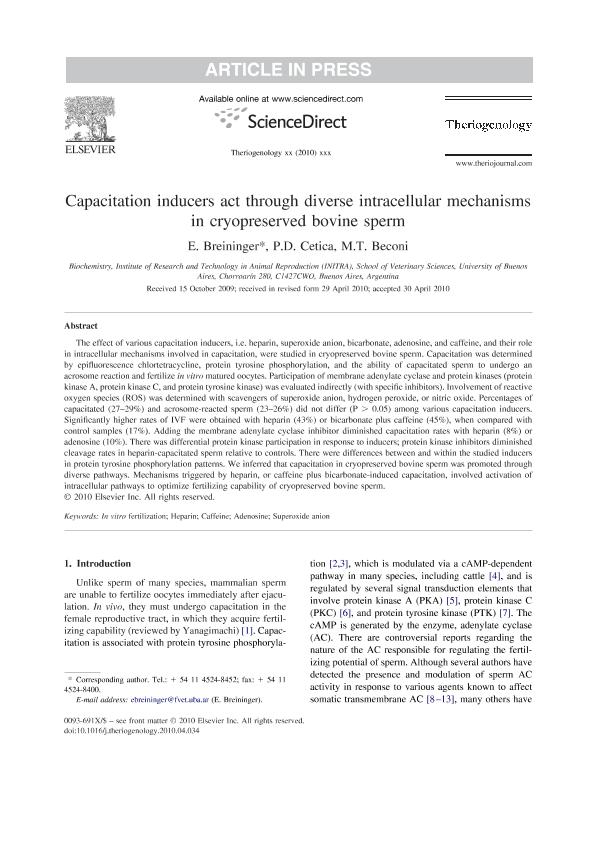Mostrar el registro sencillo del ítem
dc.contributor.author
Breininger, Elizabeth

dc.contributor.author
Cetica, Pablo Daniel

dc.contributor.author
Beconi, M. T.
dc.date.available
2017-05-09T19:30:47Z
dc.date.issued
2010-10
dc.identifier.citation
Breininger, Elizabeth; Cetica, Pablo Daniel; Beconi, M. T.; Capacitation inducers act through diverse intracellular mechanisms in cryopreserved bovine sperm; Elsevier Science Inc; Theriogenology; 74; 6; 10-2010; 1036-1049
dc.identifier.issn
0093-691X
dc.identifier.uri
http://hdl.handle.net/11336/16166
dc.description.abstract
The effect of various capacitation inducers, i.e. heparin, superoxide anion, bicarbonate, adenosine, and caffeine, and their role in intracellular mechanisms involved in capacitation, were studied in cryopreserved bovine sperm. Capacitation was determined by epifluorescence chlortetracycline, protein tyrosine phosphorylation, and the ability of capacitated sperm to undergo an acrosome reaction and fertilize in vitro matured oocytes. Participation of membrane adenylate cyclase and protein kinases (protein kinase A, protein kinase C, and protein tyrosine kinase) was evaluated indirectly (with specific inhibitors). Involvement of reactive oxygen species (ROS) was determined with scavengers of superoxide anion, hydrogen peroxide, or nitric oxide. Percentages of capacitated (27–29%) and acrosome-reacted sperm (23–26%) did not differ (P > 0.05) among various capacitation inducers. Significantly higher rates of IVF were obtained with heparin (43%) or bicarbonate plus caffeine (45%), when compared with control samples (17%). Adding the membrane adenylate cyclase inhibitor diminished capacitation rates with heparin (8%) or adenosine (10%). There was differential protein kinase participation in response to inducers; protein kinase inhibitors diminished cleavage rates in heparin-capacitated sperm relative to controls. There were differences between and within the studied inducers in protein tyrosine phosphorylation patterns. We inferred that capacitation in cryopreserved bovine sperm was promoted through diverse pathways. Mechanisms triggered by heparin, or caffeine plus bicarbonate-induced capacitation, involved activation of intracellular pathways to optimize fertilizing capability of cryopreserved bovine sperm.
dc.format
application/pdf
dc.language.iso
eng
dc.publisher
Elsevier Science Inc

dc.rights
info:eu-repo/semantics/openAccess
dc.rights.uri
https://creativecommons.org/licenses/by-nc-nd/2.5/ar/
dc.subject
In Vitro Fertilization
dc.subject
Heparin
dc.subject
Caffeine
dc.subject
Adenosine
dc.subject
Superoxide Anion
dc.subject.classification
Ciencias Veterinarias

dc.subject.classification
Ciencias Veterinarias

dc.subject.classification
CIENCIAS AGRÍCOLAS

dc.title
Capacitation inducers act through diverse intracellular mechanisms in cryopreserved bovine sperm
dc.type
info:eu-repo/semantics/article
dc.type
info:ar-repo/semantics/artículo
dc.type
info:eu-repo/semantics/publishedVersion
dc.date.updated
2017-05-08T21:18:16Z
dc.journal.volume
74
dc.journal.number
6
dc.journal.pagination
1036-1049
dc.journal.pais
Estados Unidos

dc.journal.ciudad
Nueva York
dc.description.fil
Fil: Breininger, Elizabeth. Universidad de Buenos Aires. Facultad de Ciencias Veterinarias. Instituto de Investigacion y Tecnología en Reproducción Animal; Argentina. Consejo Nacional de Investigaciones Científicas y Técnicas; Argentina
dc.description.fil
Fil: Cetica, Pablo Daniel. Universidad de Buenos Aires. Facultad de Ciencias Veterinarias. Instituto de Investigacion y Tecnología en Reproducción Animal; Argentina. Consejo Nacional de Investigaciones Científicas y Técnicas; Argentina
dc.description.fil
Fil: Beconi, M. T.. Universidad de Buenos Aires. Facultad de Ciencias Veterinarias. Instituto de Investigacion y Tecnología en Reproducción Animal; Argentina
dc.journal.title
Theriogenology

dc.relation.alternativeid
info:eu-repo/semantics/altIdentifier/doi/http://dx.doi.org/10.1016/j.theriogenology.2010.04.034
dc.relation.alternativeid
info:eu-repo/semantics/altIdentifier/url/http://www.sciencedirect.com/science/article/pii/S0093691X10002451
Archivos asociados
